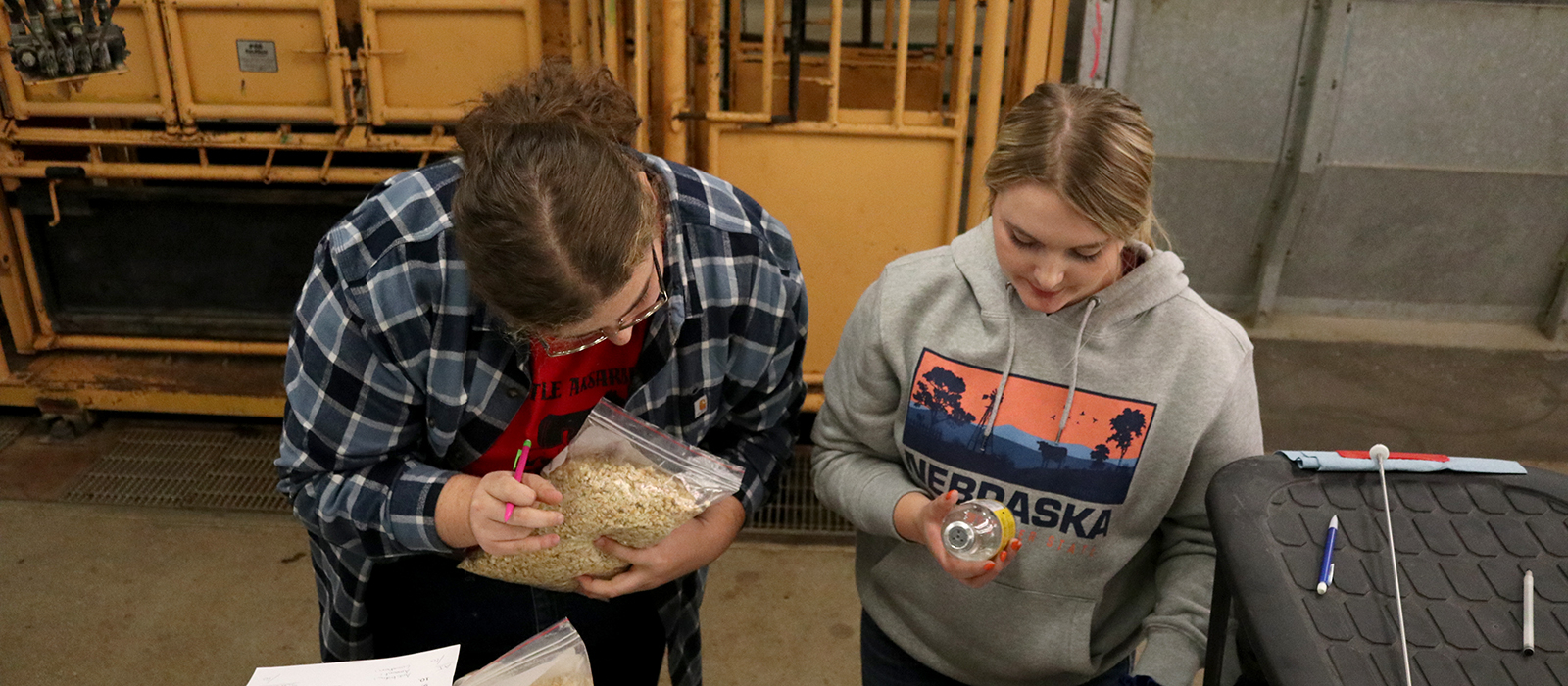The Animal Science Management Certificate online program is open to degree‐seeking students at other two‐ and four‐year institutions, University of Nebraska–Lincoln undergraduates who are not Animal Science majors, and non-degree seeking associate degree holders.
To be accepted into this fully online certificate program as a non-degree seeking student, a student must have a high school diploma or G.E.D., and at least one semester of college level biology credit. For students not enrolled at the University of Nebraska-Lincoln, the admission procedure is:
- Complete the visiting student application (select "Visiting" as your type of application).
- Pay the application fee.
- Provide proof of high school graduation or equivalent (G.E.D.) and biology credit.
Current students wishing to add this certificate to their Nebraska undergraduate degree program, should contact one of the cerificate advisors. Upon verification of completion of the prerequisite requirements with the appropriate grade, the department will admit them into the certificate program.
For current University of Nebraska–Lincoln students (not Animal Science majors) to be accepted into this undergraduate certificate program, a student must have at least one semester of college-level biology and one semester of college‐level chemistry credit. Courses must meet the University of Nebraska–Lincoln CASNR transfer guidelines to be accepted.
What You'll Learn
The courses Animal Science Management Undergraduate Certificate program will develop certificate awardees who:
- Understand the biology and chemistry of the life sciences and apply the principles to animal nutrition, growth, reproduction, genetics and management of animals and their products.
- Develop animal nutrition, growth, reproduction, genetics, and management recommendations related to the specific animal or animal product in the career paths related to their selected area of interest.
- Propose solutions to problems in the production and/or management of animals or animal products specific to their area of interest.
18
Credit Hour Certificate
19
Courses To Choose From
What Courses Will You Take?
Students must complete 18 credit hours of Animal Science from the required and optional courses listed below. At least 10 credit hours must be completed at the 300 level or higher. Students should complete two credits in an experiential learning project (ASCI 395A, ASCI 395B, or ASCI 395D) in order to complete the certificate.
Course Descriptions
Required Courses (Credit hours):
Choose two of the below 100/200 level courses (6-8 credits)
ASCI 100: Fundamentals of Animal Biology and Industry (3)
(100) Overview of the industries in animal science; fundamentals of animal biology related to their application in those industries; and trends and current issues related to production and consumption of animal products important for human welfare.
Instructor: Bryan Reiling
ASCI 210: Animal Products (3)
(210) Knowledge of edible animal products with particular emphasis to meat products from livestock and poultry. Includes all aspects of the meat industry from slaughter to consumption. Methods of slaughter and fabrication, conversion of muscle to meat, processing techniques, preservation and storage, and consumer related topics discussed and demonstrated.
Instructor: Michaella Fevold
ASCI 240: Anatomy and Physiology of Domestic Animals (4)
(320) Fundamentals of the anatomy and physiology of domestic animals.
Instructor: Ty Schmidt
ASCI 250: Animal Management (4)
(250) Principles of managing animals in typical production systems. Basics of managing beef, dairy, poultry, sheep, and swine through the life cycle for economic and efficient production.
Instructor: Bryan Reiling
ASCI 251: Introduction to Companion Animals (3)
(251) Overview of pets, their care, nutrition, reproduction behavior, and health issues; exploration of other ways in which these animals can be used (e.g., in therapy, teaching).
Instructor: Lisa Karr
ASCI 252: Introduction to the Horse Industry and Management (3)
(252) Provides an introduction to the equine industry including history and basic biology of the horse, proper care and acceptable management procedures, and current issues. An overview of basic equine anatomy and physiology will be discussed as it relates to managerial principles associated with proper hoof care, disease prevention, breeding and genetics, nutritional management, reproduction, and animal welfare.
Instructor: Lena Luck
ASCI 271: Companion Animal and Equine Behavior (3)
(271) Companion animal and equine behavior. Application of behavior principles to describe normal and problem behaviors of common companion animals and horses.
Instructor: Lena Luck, Lisa Karr
Choose three or four of the below 300/400 level courses (8-10 credits):
ASCI 310: Fresh Meats (3)
(310) Fresh meat from beef, pork, lamb, and poultry. Characteristics of muscle, meat technology, preservation, merchandising concepts, and markets.
Instructor: Ty Schmidt
ASCI 321: Companion Animal Nutrition (3)
Digestive anatomy and physiology of companion animals including dogs, cats, small mammals, and exotic species. Unique nutrient requirements, pet food formulation, and regulations.
Instructor: Lisa Karr
ASCI 322: Equine Nutrition (2)
Equine nutrition including digestive anatomy and physiology. Nutritional requirements of horses as related to growth, reproduction, and performance. The relationship of nutrition to disease and environment. Management practices and application of current equine nutritional research.
Instructor: Kathy Anderson
ASCI 342: Equine Reproduction (2)
Anatomy and physiology of stallion and mare reproductive systems. Estrous detection systems, artificial and natural breeding techniques, infertility, semen collection and processing, reproductive management, and record keeping.
Instructor: Kathy Anderson
ASCI 370: Animal Welfare (3)
In-depth exploration of the issues involved in animal use. The historical, biological, ethical, and social aspects of human/animal interactions in Western culture.
Instructor: Ruth Woiwode
ASCI 410: Processed Meats (3)
Science and technology of modern meat processing. Utilization of meat, non-meat ingredients, and processing techniques and their impact on processed meat characteristics. Laboratory provides hands-on application with the preparation, development, and evaluation of processed meats products.
Instructor: Gary Sullivan
ASCI 421: Advanced Animal Nutrition (3)
Advanced course dealing with the nutrition of domestic animals. In-depth coverage of nutrients, nutrient metabolism, and nutrient requirements. Biochemical and physiological functions of nutrients in life processes.
Instructor: Jim MacDonald
ASCI 422: Advanced Feeding and Feed Formulation (3)
Feeding practices for domestic animals. Applied animal nutrition and feed formulation.
Instructor: Andrea Watson
ASCI 450: Horse Management (3)
Light horse production. Nutrition, reproduction, management, housing, and principle usage of light horses.
Instructor: Kathy Anderson
Choose one of the following experiential learning courses (2 credits)
ASCI 395A: Experiential Learning for Career Development in Animal Sciences - Industry Experiences (2)
(395A) Extension and application of the animal science curriculum within the context of industry (e.g., internship), extension and service, research, or teaching experience.
Instructor: Michaella Fevold
ASCI 395B: Extension and Service Experiences (2)
(395B) Extension and application of the animal science curriculum within the context of industry (e.g., internship), extension and service, research, or teaching experience. A faculty adviser for the area of interest must be identified prior to registering for the course.
Instructor: Michaella Fevold
ASCI 395D: Research Experiences (2)
Extension and application of the animal science curriculum within the context of industry (e.g., internship), extension and service, research, or teaching experience. A faculty adviser for the area of interest must be identified prior to registering for the course.
Instructor: Michaella Fevold
Undergraduate Catalog Listing
Meet Your Animal Science Mangement Certificate Advisors

Dr. Kathy Anderson
Dr. Kathy Anderson is a Professor of Animal Science and a Horse Extension Specialist at the University of Nebraska-Lincoln. Dr. Anderson teaches six courses, including Principles of Horse Evaluation and Judging (ASCI 300E), Horse Industry Study Tour (ASCI 311A), Equine Nutrition (ASCI 322), Equine Reproduction (ASCI 342), Advanced Horse Evaluation and Judging (ASCI 400E), and Horse Management (ASCI 450).
Contact Dr. Anderson
Dr. Lisa Karr
Dr. Lisa Karr is a Professor of Animal Science at the University of Nebraska-Lincoln. She serves as a faculty advisor and is the undergraduate program coordinator for the Department of Animal Science. Dr. Karr teaches four undergraduate courses, which include Companion Animal Behavior (ASCI 271), Introduction to Companion Animals (ASCI 251), Companion Animal Nutrition (ASCI 321), and Human-Companion Animal Interactions (ASCI 171).
Contact Dr. Karr
Dr. Bryan Reiling
Dr. Bryan Reiling is an Associate Professor of Animal Science and a Livestock Management Extension Specialist at the University of Nebraska-Lincoln. Dr. Reiling teaches five courses, including Fundamentals of Animal Biology and Industry (ASCI 100), Animal Production Skills (ASCI 150), Animal and Carcass Evaluation (ASCI 200), Animal Management (ASCI 250), and Principles of Meat Animal Evaluation (ASCI 300D).
Contact Dr. ReilingHow to declare the certificate?
Students should work with the certificate advisor who most closely matches their Animal Science interest to declare the certificate and start the program.
